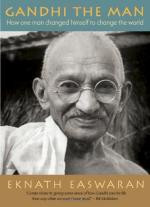
|
| Name: _________________________ | Period: ___________________ |
This test consists of 15 multiple choice questions and 5 short answer questions.
Multiple Choice Questions
1. What does the author say is Gandhi's message?
(a) Love others above yourself.
(b) All religions are right.
(c) Bring peace to all.
(d) His life.
2. Indeed one of the things that was most remarkable to Easwaran, and to Louis Fischer, the American journalist who followed Gandhi's campaigns in India for many years, was how what?
(a) How much privacy Gandhi needed.
(b) How not private Gandhi was.
(c) How private Gandhi was.
(d) How little privacy Gandhi received.
3. Describe Gandhi's evening walks.
(a) They were a parade of adoring community members.
(b) They were quiet.
(c) They were a time for him to be with his wife and children.
(d) They were slow and peaceful.
4. The final chapter Eknath Easwaran writes is focused on the daily habits and the things that defined the personality of Gandhi as what?
(a) Needing his private life.
(b) An individual in his public life.
(c) An individual in his private life.
(d) Not trusting those who need a private life.
5. How does Easwaran close this chapter?
(a) With a few more quotes from Gandhi.
(b) Words from the Gita.
(c) With a prayer.
(d) With a letter from Kasturbai.
6. The idea was detachment from the result of one's actions, so that one's focus is on what?
(a) Others.
(b) God.
(c) One's needs.
(d) The spirit of his actions.
7. Was Gandhi burdened by worry about what was to come?
(a) Yes, somewhat.
(b) Yes, at times.
(c) Yes, very much.
(d) No.
8. On what does one who loves the Lord of Love focus?
(a) Giving love to others.
(b) Living in the spirit of love.
(c) How to love oneself.
(d) Where to find love.
9. What does Rambha give Gandhi to say?
(a) Rama, rama, rama.
(b) Stay away, Fear.
(c) I am not afraid.
(d) The Lord's Prayer.
10. One who loves the Lord of Love is able to learn from what?
(a) One's mistakes.
(b) Other's mistakes.
(c) The Lord of Love.
(d) The love of others.
11. During the walks with Gandhi, people would do what?
(a) Give him advice.
(b) Ask him for advice.
(c) Pray for him.
(d) Follow him silently.
12. Evenings for Gandhi were made up of what kind of meals?
(a) Long.
(b) Quiet.
(c) Communal.
(d) Boisterous.
13. What keeps a mind steady in every circumstance?
(a) Enough sleep.
(b) Confidence.
(c) God.
(d) A mantra.
14. A united mind is trained wholly to what?
(a) The needs of others.
(b) The needs of the individual.
(c) The same cause.
(d) The desires of the Lord.
15. His body was so light and strong that what happened?
(a) Gandhi annoyed many who wanted to talk to him.
(b) Gandhi lost many of his followers.
(c) Gandhi walked for great distances.
(d) Gandhi walked at a fast pace.
Short Answer Questions
1. His ashram family, however, the ones who came to be called his _____________________ were the ones who knew best the man Gandhi was in his daily life.
2. Gandhi used what Rambha taught him his whole life, repeating it rhythmically when?
3. The elephant holding a piece of bamboo was enough to quiet their trunks the same way what is enough to still the busy-ness of a wandering and restless mind?
4. At Sevagram, people were so drawn to him, that what happened?
5. Easwaran explains that Gandhi was quoting what from Hindu scripture?
|
This section contains 569 words (approx. 2 pages at 300 words per page) |

|




